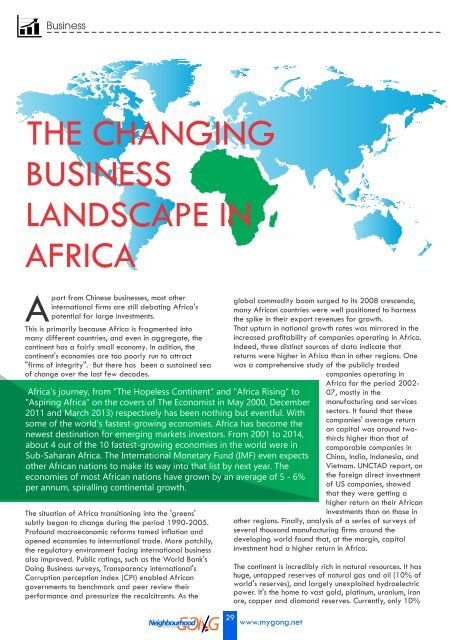Create successful ePaper yourself
Turn your PDF publications into a flip-book with our unique Google optimized e-Paper software.
Business<br />
THE CHANGING<br />
BUSINESS<br />
LANDSCAPE IN<br />
AFRICA<br />
IT'S<br />
ABOUT<br />
TIME, AFRICA<br />
Apart from Chinese businesses, most other<br />
international firms are still debating Africa's<br />
potential for large investments.<br />
This is primarily because Africa is fragmented into<br />
many different countries, and even in aggregate, the<br />
continent has a fairly small economy. In adition, the<br />
continent's economies are too poorly run to attract<br />
"firms of integrity". But there has been a sustained sea<br />
of change over the last few decades.<br />
Africa's journey, from "The Hopeless Continent" and "Africa Rising" to<br />
"Aspiring Africa" on the covers of The Economist in May 2000, December<br />
2011 and March 2013) respectively has been nothing but eventful. With<br />
some of the world's fastest-growing economies, Africa has become the<br />
newest destination for emerging markets investors. From 2001 to 2014,<br />
about 4 out of the 10 fastest-growing economies in the world were in<br />
Sub-Saharan Africa. The International Monetary Fund (IMF) even expects<br />
other African nations to make its way into that list by next year. The<br />
economies of most African nations have grown by an average of 5 - 6%<br />
per annum, spiralling continental growth.<br />
The situation of Africa transitioning into the 'greens'<br />
subtly began to change during the period 1990-2005.<br />
Profound macroeconomic reforms tamed ination and<br />
opened economies to international trade. More patchily,<br />
the regulatory environment facing international business<br />
also improved. Public ratings, such as the World Bank's<br />
Doing Business surveys, Transparency international's<br />
Corruption perception index (CPI) enabled African<br />
governments to benchmark and peer review their<br />
performance and pressurize the recalcitrants. As the<br />
global commodity boom surged to its 2008 crescendo,<br />
many African countries were well positioned to harness<br />
the spike in their export revenues for growth.<br />
That upturn in national growth rates was mirrored in the<br />
increased protability of companies operating in Africa.<br />
Indeed, three distinct sources of data indicate that<br />
returns were higher in Africa than in other regions. One<br />
was a comprehensive study of the publicly traded<br />
companies operating in<br />
Africa for the period 2002-<br />
07, mostly in the<br />
manufacturing and services<br />
sectors. It found that these<br />
companies' average return<br />
on capital was around twothirds<br />
higher than that of<br />
comparable companies in<br />
China, India, Indonesia, and<br />
Vietnam. UNCTAD report, on<br />
the foreign direct investment<br />
of US companies, showed<br />
that they were getting a<br />
higher return on their African<br />
investments than on those in<br />
other regions. Finally, analysis of a series of surveys of<br />
several thousand manufacturing rms around the<br />
developing world found that, at the margin, capital<br />
investment had a higher return in Africa.<br />
The continent is incredibly rich in natural resources. It has<br />
huge, untapped reserves of natural gas and oil (10% of<br />
world's reserves), and largely unexploited hydroelectric<br />
power. It's the home to vast gold, platinum, uranium, iron<br />
ore, copper and diamond reserves. Currently, only 10%<br />
29<br />
www.mygong.net
















